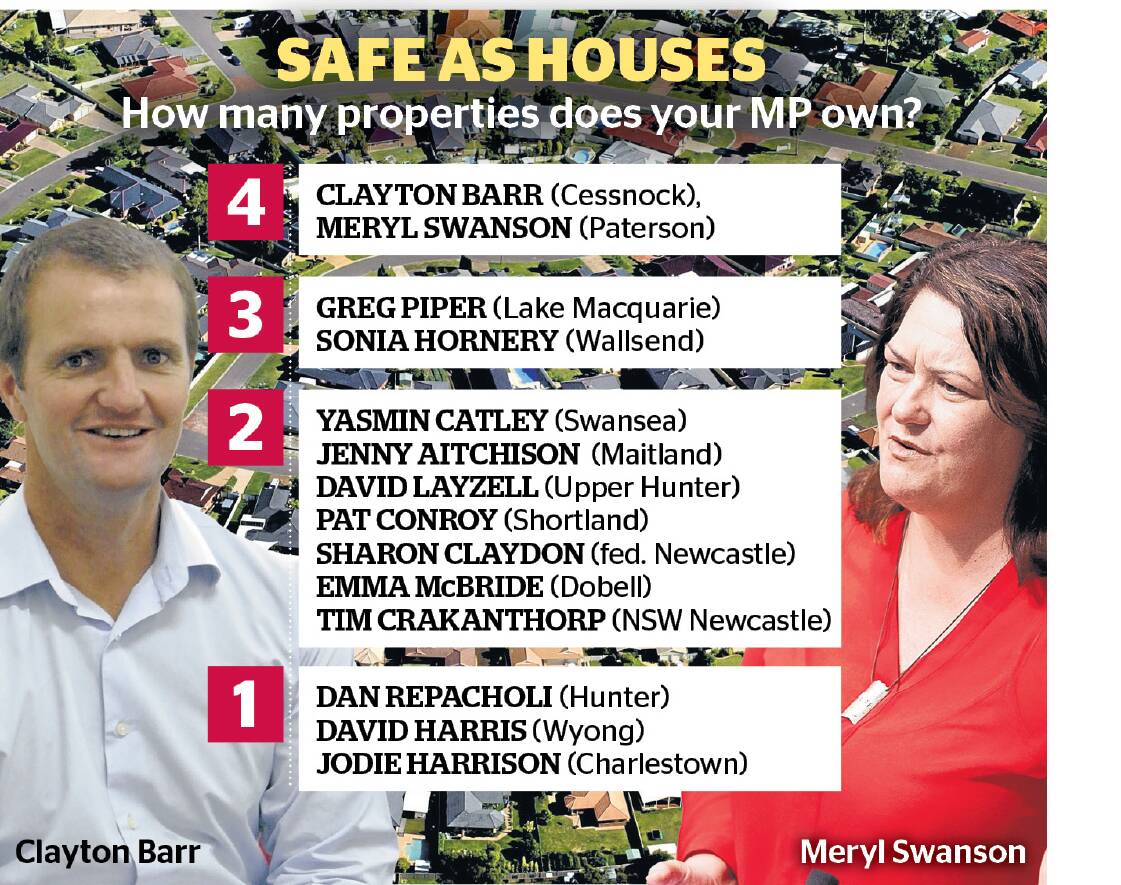
The region's 14 state and federal MPs own a combined 31 properties, with only three owning a single home, disclosure documents have revealed.
Housing advocates groups say politicians are doing nothing wrong, but raised questions about the level of influence the investment properties had on housing decisions and if MPs actually understood the plight of renters trying to crack the market.
The vast majority of local politicians own two properties, however Cessnock MP Clayton Barr and Paterson MP Meryl Swanson own four properties, and a further three MPs own three properties.
Only Wyong MP David Harris, Charlestown MP Jodie Harrison and recently elected Hunter MP Dan Repacholi registered just one property.
Those with two properties included two properties include Yasmin Catley (Swansea), Jenny Aitchison (Maitland), David Layzell (Upper Hunter), Pat Conroy (Shortland) Sharon Claydon (federal Newcastle), Emma McBride (Dobell).
NSW Newcastle MP Tim Crakanthorp has two properties under his name, and his disclosure register shows his wife owns a further three properties.
Mr Crakanthorp is currently being investigated by the NSW Independent Commission Against Corruption for allegedly failing to fully disclose significant land holdings held by his parents-in-law within the Hunter.
Wallsend MP Sonia Hornery and Lake Macquarie MP Greg Piper both have three properties.
On her disclosure register, Ms Hornery received no rental income from her three properties, with one acting as her primary residence, the other as her Sydney sitting week accommodation and the third occupied by her mother.
Many of the MPs owned a property in either Sydney or Canberra, which was used as their accommodation during sitting weeks.
Under parliamentary expense rules, federal MPs are able to claim $299 a night to stay in Canberra to attend official business including parliamentary sittings.
The allowance is payable regardless of whether MPs stay in a property they own.
At a state level, NSW politicians that don't reside in the state's capital receive a "Sydney allowance", which helps them cover various costs including accommodation.
The Australian Institute director Richard Denniss said the public was right to wonder what influence multiple home ownership had on the mindset and worldview of their local MP.
"I'm not suggesting any politicians are behaving inappropriately, but put it this way; if three-quarters of Australian politicians owned shares in a particular company, the public would be nervous about what's on their mind when voting on legislation affecting that company," Mr Dennis said.
"When very large numbers of MPs own investment properties, aren't we entitled to wonder if they see things clearly as they might otherwise?
"These people are in charge of designing and redesign the system, so its an issue that warrants scrutiny."
The Union of NSW Tenants chief executive Leo Patterson Thompson said the housing crisis had led many voters to question how the decisions of politicians were influenced by their investments, and if their elected representatives were genuinely representing the life experiences of their community.
"[Multiple home ownership] doesn't appear to influence the on-the-floor vote of parliament [for housing issues], as MPs vote along party lines...but that's the public vote," Mr Patterson Thompson said.
"The bit we don't know is the behind-the-scenes discussions. That's much harder to unpick."
Mr Patterson Thompson said politicians could use trust accounts to hide the true number of properties they own and called for tighter disclosure rules, including how the property is used and if there is rental income.
"We need real transparency like we do with stocks and shares," he said.
Mr Denniss said the Australian taxation system was designed to encourage those with expendable income to invest in housing and abolishing the 50 per cent discount on capital gains tax would make investment houses less appealing.
"The other way we could increase housing - and some might say it's a bit old fashioned - but we could spend more money on public housing," he said.







